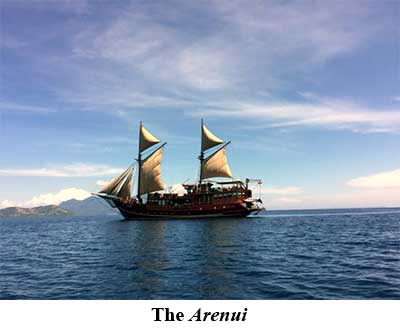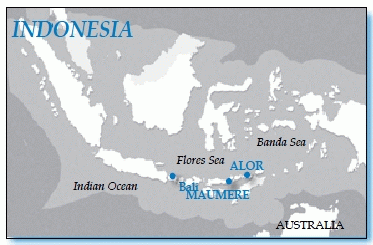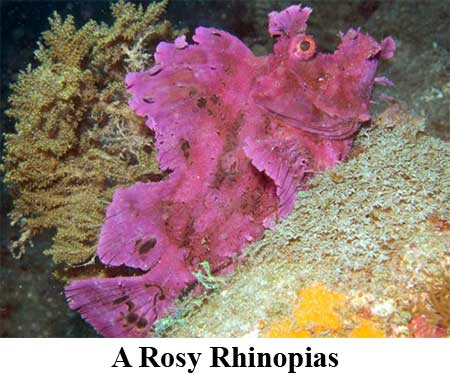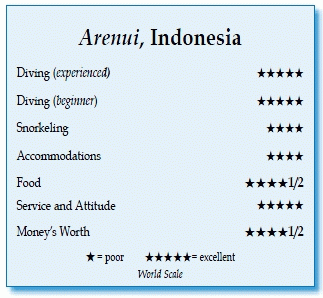Arenui, Alor Archipelago, IndonesiaContents of this Issue: Arenui, Alor Archipelago, Indonesia A Major Mask Recall Due to Shattering Glass Undercurrent Can Sure Use Your Help Fantasy Island, Roatan, Honduras Latest Shark Research: Shields Are Effective, Bubble Curtains Arenít Aqua Lung Facing a Class-Action Lawsuit What on Earth Were They Thinking? Get the Most from Your GoPro Underwater Fugitive Dive Operators Found, Then Charged with Manslaughter Lessons Learned from Dead Divers Whatís Going on with the Aggressor Fleet? Wearables Come to the Dive Industry Editorial Office: Ben Davison Publisher and Editor Undercurrent 3020 Bridgeway, Suite 102 Sausalito, CA 94965 a unique critter haven, but a notch below luxury from the August, 2015 issue of Undercurrent
Dear Fellow Diver: A whopping 13 Rhinopias sightings broke Arenui's record, besting the previous eight seen on a trip to Alor. Now, this may mean nothing if you haven't been to the Indo-Pacific, but the Rhinopias, a member of the scorpionfish family, is among the must-sees for divers seeking the exotic -- and why divers take out second mortgages to make these expensive trips. Rhinopias, camouflaged loners with limited range, walk about on their fins, an exotic sight. And to view the load of macro critters in these waters, I put my magnifying glass to a lot of use, especially to peer at the half-inch pygmy seahorses, the more common pink with red warts (it was first named in 2008 as Pontohi), white with yellow patches, and Denise's yellowish-brown one. I also ogled an ornate ghost pipefish, exotic in its spiked appearance when contrasted with the halimeda, which looks like a segmented green leaf with a long snout.
When I arrived in Maumere, Flores, to board the Arenui, the traditional Phinisi design tickled my senses. Built in 2009 from 70 percent recycled local wood, she is 140 feet long, with an ironwood hull. Her massive sails are only cosmetic, because they provide insufficient power. Once I boarded, I had to wait in the hot and humid dining area (no air-conditioning!) while the two cruise directors escorted guests by pairs to their rooms for a prolonged briefing. A cool drink was no consolation for the stultifying half-hour wait, but I was then pleased by my AC-cooled cabin, twice the size of cabins on other liveaboards I've traveled. One of four on the main deck, it had a large window, a desk and chair, wardrobe, twin beds kitty-corner to each other, colorful linens and even choice bed pillows. In the ensuite bathroom, the shower drained through wooden lattices, but it was not vented, so I needed to hang my towels in the cabin to dry. One deposited toilet paper (oh, those marine heads) into a lidded container which was, thankfully, emptied twice daily. We began our voyage with a nine-hour night crossing, filled with loud cracks, bangs and knocks, not the gentle creaking I've found aboard other liveaboards. It was one sleepless night, as the exhaust fumes seemed to leak in, but thankfully most other motoring occurred during daylight. Our checkout dive at Serbete was an excellent introduction -- squid laying eggs, threadlike nudibranchs hanging on a fan, blue-mouthed morays and colorful soft corals. Motoring on, we made five dives around Adonara Island in Leba Bay, where it was party time for schools of dancing shrimp, a minute filefish, tiny radial filefish that looked hairy with their flaps, and a score of small striped catfish.
Lisa and her Spanish husband, "G" (short for Guillem), had been aboard six months and were both the cruise directors and instructors, supported by three experienced Indonesian divemasters. Lisa did accounting tasks, and G was the go-to guy for first aid, equipment repairs and general management. In their early thirties, they were capable and friendly. I was part of a trip organized by Hergen Spalink and Kerri Bingham, owners of the photography-focused dive trip outfitter Got Muck. They chartered the boat, along with renowned underwater photographer Burt Jones, and each rotated among the dive groups. The mostly American customers, a convivial group, represented many careers -- IT folks, psychologists, a scientist, a college administrator, banker, caretaker, pharmacist, volunteer dentist in remote areas, and an alpaca farmer/professor -- and a good share were retired. On most days, we made four dives, some days fewer, which usually included a 6:30 p.m. night dive. Two groups of four divers were taken on schedule to nearby dive sites in the two fiberglass 26-foot dinghies. The other eight would suit up and board about a dozen steps down when the dinghies returned. Crew members loaded individual baskets with masks, lights and cameras, while fins, weights and tanks with BCDs were left in the dinghies. Once, my tank was not filled, but the crew quickly replaced it. The procedure: Backroll in, and after the dive, exit up a sturdy ladder after handing up your weights and BCD/tank. Back on board, we'd traipse through the dining room on the way to the dive dressing area, so the crew had to constantly dry the pathway to prevent slips. They assisted pulling off tight wetsuits and rinsed them in a container of chemically treated water, if desired. But there was no shower on the dive deck, only one inconvenient bathroom across from the stairs we used to descend to the dinghy. Good-sized cubbies, large cushioned benches and plenty of hanging space made for an otherwise serviceable dive deck. Crew members carefully rinsed and air-gunned cameras, but camera tables in the dining area were at a premium and inadequate for the big professional gear of Burt, Hergen and a couple other divers, so gear often took up cushioned lounge seats. Dining tables doubled as camera workspace.
My dive buddy and I felt the need for a break from muck, so I requested a dive at Rainbow Reef, where I had once done an exploratory dive. The crew didn't know the site, but I had good enough notes to identify it, so we gave it a go. It was a stunning, colorful dive -- very fishy, waving soft corals and hard coral bommies with thick coral coverage. I'm ho-hum when it comes to sea cucumbers, but a bright red sea apple (a round sea cucumber with yellow and red foot rows and orangish-red tentacles) caught my attention. Nearby, dozens of two-inch yellow sea cucumbers aggregated. At Clown Alley, south of Pura, I spotted acres of anemones housing a few anemonefish species. There was enough current to allow slow drifting and easy stopping to enjoy the great numbers of anthias, butterflyfish, trevally chasing fusiliers and sea snakes weaving in and out. As we motored toward Komba Island, its volcano, Batu Tara, erupted every 20 minutes. I fiddled with my camera, hoping to get night shots of the volcano spewing lava and boulders down its side into the water. As Arenui rested 600 feet away, the volcano's fireworks were a once-in-a-lifetime experience. Other than oohs and ahs, there was little conversation, as everyone jockeyed for their shots. Eventually, we lowered cameras and just marveled at the power of the eruptions. As we slowly motored away, the crew was kept busy cleaning ash from every surface and crevice. Everyone dived nitrox, and the mix was checked by the engineering crew, with a list passed around, indicating 30 percent O2, for each to initial (it's inconvenient for one to check his own mix because tanks are in the dinghies). I once asked G if I could check some of the tanks for the next dive, so we descended to the engineering room. G analyzed the first tank and got 28 percent; the second one was the same. An engineer checked the same tanks with his newer, pricier gauge and got readings of 30.3. G said that two tall oxygen tanks in the engineering area can provide enough oxygen for two stressed divers while they journey to the closest hyperbaric chamber, a 20-hour trip to Bali. When I asked about a helicopter evacuation, he only chuckled. Forget that.
Twenty crew, three captains and two cruise directors kept the vessel running smoothly. Service was exceptional and fits what I would expect on a "luxury" dive vessel. If I asked for one of something, Jam Jones, a feisty dining attendant, would ask, "Don't you want two?" Within a day, my preferences had been noted and were anticipated before I asked. Jam knew just how I wanted my gin and tonic prepared -- lots of ice, gin, lime and, oh yes, splashes of tonic, too. While the Arenui advertises gourmet food, I'd describe it as good, attractively presented and served with grace. Other than glasses of varied tasty broths, it seemed as if the buffet lunches were often retreads from the night before -- chicken, beef and fish served with salad, rice and noodles. The main breakfast was made-to-order, with choices including Indonesian chicken noodle soup with fried rice or noodles from the buffet, omelets, pancakes, French toast, oatmeal and bacon or sausage. Dinner was served on the upper deck's under-the-stars dining area after the last dive. Examples: appetizers of sashimi and papaya beef salad; soup of red bean or cauliflower; main courses of grilled chicken breast with Balinese tomato sauce, fish with kismis orange served with potatoes and vegetable, and lasagna. Desserts often came with ice cream; my favorite was the chocolate lava cake. An extensive Indonesian menu was available nightly if nothing on the main menu suited -- Ifumi, stir-fried veggies in a crispy noodle bowl, was my favorite. The upper "sky deck" sported a comfortable, canvas-covered lounging space to easily accommodate 16 passengers. At the bow is the dining area for the evening meal, two tables with padded bench seating and chairs. The captains' wheelhouse is in between. Most of us took the morning off from diving Alor Bay for a visit to see the Abui tribe. Walking uphill on a rough path, we came to a tiny, primitive village (no electricity or water) with several thatched huts. They were dressed for performance, dancing the lego-lego; jangling ankle bracelets and chanting filled the area. The chief was suited up with the bow, arrows and spear they use for hunting; a couple of divers negotiated with the chief to buy a few. They grow their own tobacco, which they tightly wrap, then smoke. Betel nut juice stained teeth and the ground.
After dinner the last night on the upper deck, crew members struck an upbeat tempo with guitars and drums that got divers gyrating on the floor. One of the divemasters climbed over the railing, dressed and painted like a warrior and wearing a two-foot-long, strapped-on "penis," which he lewdly pantomimed penetrating a lady diver lounging on the sofa; as he raised her legs, she held on to her wine, giggling. A cross-dressed male divemaster dressed in wig, makeup and not much else, seductively approached male divers and got a few to dance with him. A male Aussie diver wearing a sundress added to the frivolity. Fun, for sure. Odd, for sure. You had to be there. Too much hype for the Arenui? From its website and many reviewers, "luxury," "boutique" and "gourmet" are commonly used terms which built my expectations, and in a way, I guess, that let me justify spending big bucks. Now, I would say that the Arenui gets top marks for crew graciousness, superb diving and attempting to meet our needs, which was their stated goal. The complimentary one-time, 30-minute massage on the sky deck adds to the vote for luxury (but who can stop at 30?). The cabins are luxurious, and the upper deck simply great. (A few folks complained about plumbing issues, but my room had none.) Food was very good, and varied with the Indonesia special menu, but not gourmet. To earn a "luxury" award, the main deck dining and lounge area would surely need to be air-conditioned and more comfortable, and more desk space is required to accommodate serious photographers. And no shower on the dive deck is also a mark against it. The Arenui is certainly boutique, but luxury it ain't. -- J.D. Our undercover diver's bio: J. Diver says, "I began diving 12 years ago, quickly becoming obsessed observing fish and critter behavior. A thousand dives later, with plenty of time to burn, I've made half my dives in the Caribbean and the remainder mostly in Indonesia, Philippines, Japan, Palau, Papua New Guinea, the Solomon Islands and Turkey. Using the excuse of absorbing local culture, I've drunk kava in Fiji, penis soup in PNG, tiger penis sake in Yonaguni, Japan, and enjoyed betelnut chewing and spitting in Palau. I'm convinced it helped my fish ID skills in those regions. I'm too absorbed watching fishes to fiddle with a camera."
|

I want to get all the stories! Tell me how I can become an Undercurrent Online Member and get online access to all the articles of Undercurrent as well as thousands of first hand reports on dive operations world-wide
| Home | Online Members Area | My Account |
Login
|
Join
|
| Travel Index |
Dive Resort & Liveaboard Reviews
|
Featured Reports
|
Recent
Issues
|
Back Issues
|
|
Dive Gear
Index
|
Health/Safety Index
|
Environment & Misc.
Index
|
Seasonal Planner
|
Blogs
|
Free Articles
|
Book Picks
|
News
|
|
Special Offers
|
RSS
|
FAQ
|
About Us
|
Contact Us
|
Links
|
3020 Bridgeway, Ste 102, Sausalito, Ca 94965
All rights reserved.

 Yes indeed, this April dive trip was designed to
find unusual and fascinating critters, but they often
live in not-so-beautiful places, so magnificent coral
sites were at a premium, by choice of the tour directors.
When I dived this area aboard the Komodo Dancer six years ago, we
covered many more
colorful coral sites,
but then I saw far
fewer exotic macro
critters. Generally,
the terrain varied
from sloping walls
to coral bommies,
and mostly blacksand
rubble with
lots of hiding places
for the critters
and tiny fish. With
water varying from 77 degrees in the south to 83
degrees along the northern route,
diving was generally quite pleasant,
though occasional thermoclines
made it seem much chillier.
Yes indeed, this April dive trip was designed to
find unusual and fascinating critters, but they often
live in not-so-beautiful places, so magnificent coral
sites were at a premium, by choice of the tour directors.
When I dived this area aboard the Komodo Dancer six years ago, we
covered many more
colorful coral sites,
but then I saw far
fewer exotic macro
critters. Generally,
the terrain varied
from sloping walls
to coral bommies,
and mostly blacksand
rubble with
lots of hiding places
for the critters
and tiny fish. With
water varying from 77 degrees in the south to 83
degrees along the northern route,
diving was generally quite pleasant,
though occasional thermoclines
made it seem much chillier. On the first evening, cruise director Lisa gave her too-long, too-precise
and too-strident vessel briefing; as rule followed rule, I felt I should be
taking notes! When I was assigned to a group of four, with Lisa as guide, I
worried that joyful diving would be impossible, as the checkout dive would
suggest. You see, my dive buddy and I decided to surface after 60 minutes,
after a beautiful dive along a terraced wall down to 69 feet. Using hand
signals, I indicated to Lisa that we were surfacing, but she started handling
my BC, trying to get air out of it,
so I pushed her away, gave the crossedforearms
signal to back off and ascended. Afterward, she said she thought we had a
problem as we had only been down 60 minutes,
not the 70 minutes stated in the
briefing. Jeez! Turns out, she is a German
lawyer, and after all, a rule is a rule,
and that's why the trains run on time.
After clearing the air, we gained a mutual
respect for each other, and she proved
to be a first-class dive guide and critter
spotter. My buddy and I monitored our
own dives and stayed down longer that the
70-minute rule.
On the first evening, cruise director Lisa gave her too-long, too-precise
and too-strident vessel briefing; as rule followed rule, I felt I should be
taking notes! When I was assigned to a group of four, with Lisa as guide, I
worried that joyful diving would be impossible, as the checkout dive would
suggest. You see, my dive buddy and I decided to surface after 60 minutes,
after a beautiful dive along a terraced wall down to 69 feet. Using hand
signals, I indicated to Lisa that we were surfacing, but she started handling
my BC, trying to get air out of it,
so I pushed her away, gave the crossedforearms
signal to back off and ascended. Afterward, she said she thought we had a
problem as we had only been down 60 minutes,
not the 70 minutes stated in the
briefing. Jeez! Turns out, she is a German
lawyer, and after all, a rule is a rule,
and that's why the trains run on time.
After clearing the air, we gained a mutual
respect for each other, and she proved
to be a first-class dive guide and critter
spotter. My buddy and I monitored our
own dives and stayed down longer that the
70-minute rule. We spent two days each at the top muck diving sites, Beang Bay/Pantar
Island and Mucky Mosque at Kalabahi. The views: Rhinopias, pygmy cuttlefish,
dwarf hawkfish, nudibranchs, harlequin crab, snake and crocodile eels, frogfish,
long-armed octopus, blue-ringed octopus, zebra crab on a fire urchin,
baby rock mover wrasse, and the illusive three-inch violet- and red-flame firefish,
black ribbon eel, a three-inch hairy octopus and a winged pipefish. What
a bonanza.
We spent two days each at the top muck diving sites, Beang Bay/Pantar
Island and Mucky Mosque at Kalabahi. The views: Rhinopias, pygmy cuttlefish,
dwarf hawkfish, nudibranchs, harlequin crab, snake and crocodile eels, frogfish,
long-armed octopus, blue-ringed octopus, zebra crab on a fire urchin,
baby rock mover wrasse, and the illusive three-inch violet- and red-flame firefish,
black ribbon eel, a three-inch hairy octopus and a winged pipefish. What
a bonanza. Effervescent Kerri kept us in good spirits, was attentive to detail and
provided assistance when needed. In the evenings, if she wasn't diving, she and
some buddies were among the first to break out the beer. In marked contrast,
Hergen had a delightfully dry sense of humor, and I doubt there is a camera
he cannot fix. Both made sure divers had outstanding sightings. Burt, a quiet
chap, was an art form underwater. After observing his subject and its habitat
from a distance, he gently approached with perfect buoyancy, clicked and then
backed away, disturbing nothing.
Effervescent Kerri kept us in good spirits, was attentive to detail and
provided assistance when needed. In the evenings, if she wasn't diving, she and
some buddies were among the first to break out the beer. In marked contrast,
Hergen had a delightfully dry sense of humor, and I doubt there is a camera
he cannot fix. Both made sure divers had outstanding sightings. Burt, a quiet
chap, was an art form underwater. After observing his subject and its habitat
from a distance, he gently approached with perfect buoyancy, clicked and then
backed away, disturbing nothing. Divers Compass: I paid $6,200 to Got Muck for the 11-night trip,
all inclusive except for purchases at the on-board boutique and
for drinks; paying by credit card came with a 2.75 percent fee,,
so I paid Got Muck by check . . . Indonesia government strictly
controls alcohol, so it's pricey -- wine was by bottle only,
ranging from $28 for Bali rose wine to $154 for French, but
most ranged between $45-$55 (drink some and save it for the next
night); my gin and tonics were $10 each, beers were $3 - $4.50,
but soda and juice were free, as were espressos . . . It's an
easy two-hour flight from Denpasar, Bali, to Maumere, $425 round trip, which
was arranged by Got Muck, which also handled baggage and pickup . . . Puri
Santrian, a traditional Balinese resort with several pools, spa and wifi, is
my go-to place for overnights in Bali; I paid $658 for three days there, and
four trips on ground transport to and from the Bali airport cost me $100 . . .
Websites: Arenui -
Divers Compass: I paid $6,200 to Got Muck for the 11-night trip,
all inclusive except for purchases at the on-board boutique and
for drinks; paying by credit card came with a 2.75 percent fee,,
so I paid Got Muck by check . . . Indonesia government strictly
controls alcohol, so it's pricey -- wine was by bottle only,
ranging from $28 for Bali rose wine to $154 for French, but
most ranged between $45-$55 (drink some and save it for the next
night); my gin and tonics were $10 each, beers were $3 - $4.50,
but soda and juice were free, as were espressos . . . It's an
easy two-hour flight from Denpasar, Bali, to Maumere, $425 round trip, which
was arranged by Got Muck, which also handled baggage and pickup . . . Puri
Santrian, a traditional Balinese resort with several pools, spa and wifi, is
my go-to place for overnights in Bali; I paid $658 for three days there, and
four trips on ground transport to and from the Bali airport cost me $100 . . .
Websites: Arenui - 